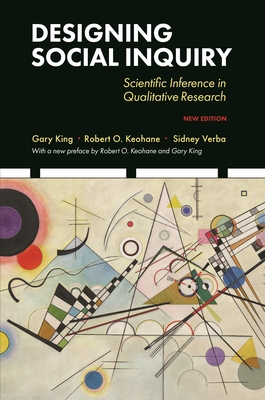The classic work on qualitative methods in political scienceDesigning Social Inquiry presents a unified approach to qualitative and quantitative research in political science, showing how the same logic of inference underlies both. This stimulating book discusses issues related to framing research questions, measuring the accuracy of data and the uncertainty of empirical inferences, discovering causal effects, and getting the most out of qualitative research. It addresses topics such as interpretation and inference, comparative case studies, constructing causal theories, dependent and explanatory variables, the limits of random selection, selection bias, and errors in measurement. The book only uses mathematical notation to clarify concepts, and assumes no prior knowledge of mathematics or statistics. Featuring a new preface by Robert O. Keohane and Gary King, this edition makes an influential work available to new generations of qualitative researchers in the social sciences.
The classic work on qualitative methods in political science
Designing Social Inquiry presents a unified approach to qualitative and quantitative research in political science, showing how the same logic of inference underlies both. This stimulating book discusses issues related to framing research questions, measuring the accuracy of data and the uncertainty of empirical inferences, discovering causal effects, and getting the most out of qualitative research. It addresses topics such as interpretation and inference, comparative case studies, constructing causal theories, dependent and explanatory variables, the limits of random selection, selection bias, and errors in measurement. The book only uses mathematical notation to clarify concepts, and assumes no prior knowledge of mathematics or statistics.
Featuring a new preface by Robert O. Keohane and Gary King, this edition makes an influential work available to new generations of qualitative researchers in the social sciences.
Get Designing Social Inquiry by at the best price and quality guranteed only at Werezi Africa largest book ecommerce store. The book was published by Princeton University Press and it has pages. Enjoy Shopping Best Offers & Deals on books Online from Werezi - Receive at your doorstep - Fast Delivery - Secure mode of Payment
 Jacket, Women
Jacket, Women
 Woolend Jacket
Woolend Jacket
 Western denim
Western denim
 Mini Dresss
Mini Dresss
 Jacket, Women
Jacket, Women
 Woolend Jacket
Woolend Jacket
 Western denim
Western denim
 Mini Dresss
Mini Dresss
 Jacket, Women
Jacket, Women
 Woolend Jacket
Woolend Jacket
 Western denim
Western denim
 Mini Dresss
Mini Dresss
 Jacket, Women
Jacket, Women
 Woolend Jacket
Woolend Jacket
 Western denim
Western denim
 Mini Dresss
Mini Dresss
 Jacket, Women
Jacket, Women
 Woolend Jacket
Woolend Jacket
 Western denim
Western denim
 Mini Dresss
Mini Dresss






























































